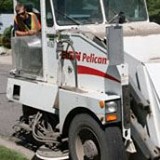
Street sweeping is an effective non-structural water quality best management practice for controlling pollutant loading from municipal road surfaces. Debris from road surface degradation and associated pollutants, leaf litter, and trash can accumulate on road surfaces over time. If not controlled, built-up debris will eventually make its way to storm sewer inlets and into the municipal separate storm sewer system (MS4), degrading water quality in receiving waterbodies.
This page provides case studies for street sweeping.
City of Roseville
The City of Roseville implemented a City-wide street sweeping program in 1990 which completed three to four sweeps a year. Since 2015, the City has completed four to five city-wide street sweeping operations over the course of a given year, targeting periods of street debris buildup associated with spring thaw (March-April), twice during fall leaf litter (October-November), and targeting areas of the City discharging to sensitive water resources. Street sweeping operations are organized by the City’s Streets Maintenance Department. On average, the City removes of 400 tons of material annually during initial spring sweeping operations and about 600 tons annually with all sweepings. The average cost to the City of spring sweeping operations is $46,000 and 440 hours of labor, with subsequent sweeps being significantly less expensive and requiring fewer labor hours.
A barrier encountered by the City early in development of their street sweeping program was related to material testing (i.e., when should collected street sweeping material be tested, how often, and what to do with contaminated materials). After years of operations, the City found the spring sweepings were almost always contaminated, primarily with diesel range organics. Due to the low cost-benefit of screening collected material and limited storage capacity for screened material, the City now ships and landfills all material collected during spring operations. Sweepings collected outside the spring season have not been considered contaminated.
More information regarding the City of Roseville’s street sweeping operations can be found on their municipal website, or by contacting Ryan Johnson, Environmental Specialist, City of Roseville Engineering Department (Ryan.Johnson@cityofroseville.com).
- Project Location: City of Roseville
- Completion Date: 1990 to Present (Ongoing)
- Organizations Involved: City of Roseville Streets Maintenance Department
- Project Budget Summary: Annual cost / hours for Spring street sweeping operations: $46,000, 440 labor hours
- Quantitative Outcomes: An average of 400 tons of debris is collected during spring sweeping operations each year. Using the MPCA street sweeping calculator and assuming an average moisture content of 27.8%, this equates to 238 pounds of phosphorus removed at a cost of $193/lb-P for the spring sweeping.

